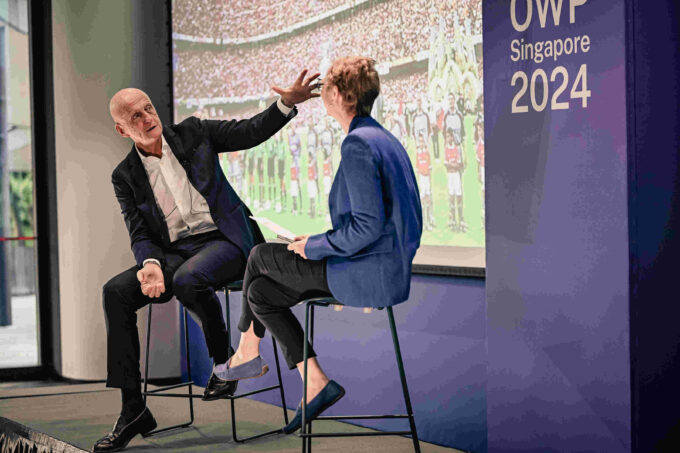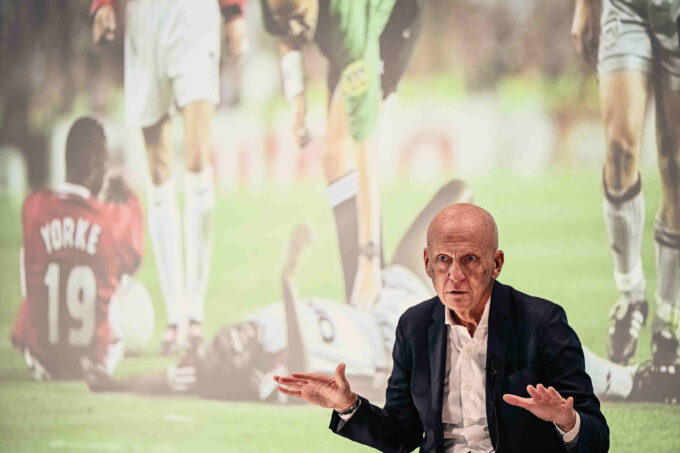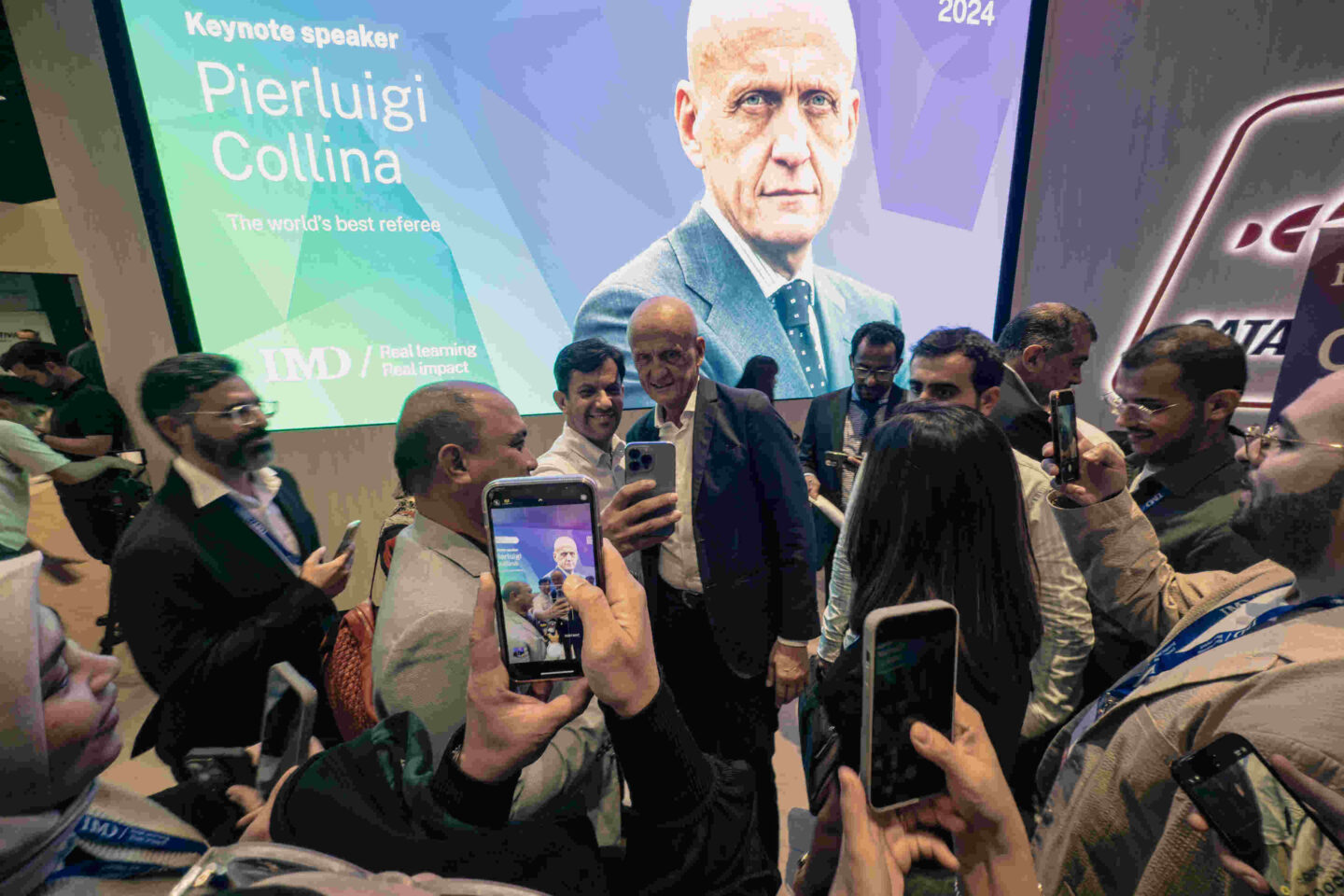
India is ready to play key role in an emerging new world order
Mridul Kumar, India’s ambassador to Switzerland, gives his personal view of his nation’s growing role as a leader in a multipolar world....
Audio available
November 20, 2024 • by Pierluigi Collina in Leadership
The most renowned referee in the world offers business executives advice on how to make the best choices possible in the heat of the moment, whether on or off the field....
I’m a very privileged person because my passion is my job, and my job is my passion. But nothing about refereeing is easy. Everything is difficult. And that’s why I love it.
Ask any decision-maker what they hate the most and they’ll say, “Uncertainty.” In football, the difference between going in one direction and another is very tiny. In business, decision-makers typically have time to consider, and they have external consultants to turn to for guidance. On the football pitch, even the biggest decisions must be taken quickly.
Next time you are feeling the pressure, imagine what it’s like to be in the middle of a stadium with 90,000 screaming people around you. It puts physical pressure on you. Plus, if it’s a high-profile tournament such as the World Cup or the Champions League, you are also live on television in every corner of the world. You know that everything you are doing is being seen by millions of people everywhere. So, if something goes wrong, it’s going to be tough to deal with.
How do you learn to block out the noise, stay focused, and take controversial decisions? Like anything in life, it comes from hard work and preparation. Knowing everything about what you are going to do is crucial. Here are my tips from my extensive experience on the football field.
In my experience, it helps to be nervous if you want to perform at the top of your game. If you’re refereeing the World Cup final, you’re excited, because you have been chosen. It’s a great achievement. For me, it’s important to be at a level of heightened feeling that stops just short of anxiety. Then you are extremely reactive, with all your senses alerted.
The important thing is that nerves don’t cross over into anxiety, which will impede your performance. How you manage this might not be the same as how your colleague does. In my early days in the profession, a famous Italian referee told me how before a match he would take a short nap for 20 minutes on a massage table. I tried this the next day, and it was my worst-ever performance. I was too relaxed. For me, nerves provide the adrenaline needed to drive results.

Most of the time mistakes are opportunities; a chance to learn, grow, and improve for next time. What’s important is not to find an alibi, an excuse, but to find a solution.
As a referee, you don’t just need to be fit and know the rules of the game. You can only make the best decisions if you know everything about the match beforehand – the style of play and tactics of the teams and individual players, for example. After all, much of what will happen on the field is predictable if you do your homework. This helps you to be in the best position possible to make a good decision.
At this level of football, you cannot justify something that went wrong by saying, “Sorry, I didn’t expect it.” You must be one step ahead, so you’re not just reacting to what happened. You need to be able to anticipate what is going to happen so it’s much more probable that your call will be right. Before the 2002 World Cup final in Japan, I spent a day and a half watching videos of all the matches played up until that point by Brazil and Germany in the competition, often rewinding and watching parts over and over again. Watching what happened in all the matches played by them separately enabled me to be prepared for the match between them. The preparation doesn’t replace the assessment of an instant, but it makes you as ready as you possibly can be, which gives you confidence.
The same is true for business leaders. You need to absorb as much information as you can about the market, your customers, and your stakeholders so that when you need to make a quick decision, you are coming from an informed position.
Although we can do everything to be very well prepared, we will still make mistakes. Even the best players in the world make them; they miss a penalty in a World Cup final. The top football clubs today are companies, some are even listed on the stock market. As a referee, you are conscious that a bad decision that leads to relegation could have a massive impact on the fortunes of both the club and the players.
The stakes are high, never more so than the match to decide who goes from the Second Division Championship through to the Premier League. The financial prize is between £150-300 million. And whether you get through or not depends on the referee’s decision – a decision taken in one second. If I were to have made a wrong call in the Champions League final and it had cost the team the trophy, it would have killed my career and had wide-ranging implications.
But very few mistakes are truly career-ending. As German philosopher Friedrich Nietzsche said: “What doesn’t kill me makes me stronger.” Most of the time mistakes are opportunities; a chance to learn, grow, and improve for next time. What’s important is not to find an alibi, an excuse, but to find a solution. That’s the difference between losers and winners. Losers always go for an excuse – it’s not my fault, it’s someone else’s. The word ‘alibi’ means ‘away’ in Latin – you’re putting the responsibility away from yourself.
Importantly, don’t dwell on your mistakes. After the match, analyze it to understand why you committed it in the first place and avoid repeating it in the future. Then forget it, because during the next match, you need a positive mentality. You need to trust yourself and to think you are very strong. That’s why when anyone asks me, “What was the biggest mistake you ever made?” I always say, “Sorry, I forgot.”

It’s easy to be on the winners’ side but I always felt for the ones who were losing. It’s important to be yourself. Don’t pretend to be someone you are not. People don’t trust actors. But develop situational leadership – learn to deal with people most effectively depending on their personalities. Sometimes a smile works much more than a strong reaction. It’s always worth trying to be on their side – try to understand why a reaction comes, players are under pressure and tired. It’s about modifying something in the moment to better connect with people.
If you play a role or follow a script, you will be immediately uncovered as inauthentic. When I refereed a match, I always reacted the way I felt in the moment. When there was a big argument between Edgar Davids and Tomáš Řepka during Euro 2000, I tried to restore peace and ended up pushing Řepka hard on the chest to make him go back, which was not something a referee should do. But that came naturally to me – and it worked!
I have always expressed what I was feeling in that moment. The referee must feel the match; you cannot be above it. I feel it, and I’m Italian, so body language is easy. Creating a language with players who have nothing in common with you is difficult. But the expression, the eyes, the tone of the whistle – for the referee, the whistle is like the voice. Without words, the players immediately understand what the referee wants to say.
Another time, when I was refereeing a UEFA Euro 2004 match between England and Turkey, England captain David Beckham missed a penalty and was taunted by Turkey’s Alpay Özalan, who poked Beckham in the face as the two players walked off at half-time. I invited both men to my dressing room to speak to me and clear the air. The conversation reset the mood, and the rest of the game was easy. When I spoke with Beckham years later, he told me what impressed him most at the time was not my words but the fact that my head was steaming in the cold December air. I was not putting on an act. They felt it and that earned respect.

“Part of my job as Chairman of the FIFA World Cup Referees Committee is to build consistency in decision-making among referees, particularly since officials come from different countries with different styles of playing the game.”
During my career as a referee, we didn’t have VAR technology to assist us with making on-field decisions at critical junctures in a match. The irony was that a game would be covered by 20-odd different cameras, but the person on the pitch couldn’t always see what was happening. This has changed today with referees having the chance to watch the same angles on the monitor as viewers see at home. Yet football will never be a perfect game. There will be some factual decisions, but most calls are matters of interpretation. Today, part of my job as Chairman of the FIFA Referees Committee is to build consistency in decision-making among referees, particularly since officials come from different countries with different styles of playing the game.
If the players trust you, they can accept even a wrong decision. To be accepted when you are wrong – and this is the same for a business leader – you cannot always be right. You can be empathetic, while at the same time firm and strong. Sometimes you do have to be autocratic because you are the boss. You cannot leave a conversation with the other person having the last word. The last word must be yours.
Establish common ground and shared experiences. Sometimes you overrule your assistant, and it’s not nice, but you must make the correct decision. You cannot make a mistake only to defend a teammate. The human reaction when you are overruled is to feel like you’re no longer part of the team, but the match goes on. This is why it’s important to put effort into keeping everyone on your team focused and loyal – because there are always more games to be played.
This article is inspired by a keynote session at IMD’s signature Orchestrating Winning Performance program, Singapore (2024), which brings together executives from diverse sectors and geographies for a week of intense learning and sharing with IMD faculty and business experts.

Italian former association football referee

July 1, 2025 • by Mridul Kumar in Geopolitics
Mridul Kumar, India’s ambassador to Switzerland, gives his personal view of his nation’s growing role as a leader in a multipolar world....
 Audio available
Audio available
June 26, 2025 • by Ngozi Okonjo-Iweala in Geopolitics
Faced with the threat of trade fragmentation, many are now waking up to the true value of preserving a rules-based system of cooperation – and business can help defend it too, says...

June 26, 2025 • by Michael Yaziji in Geopolitics
Forward-thinking leaders proactively shape their external environment, turn uncertainty into certainty, and create substantial value in the process....
 Audio available
Audio available
June 24, 2025 • by Jerry Davis in Geopolitics
The tech broligarchs have invested heavily in Donald Trump but are not getting the payback they bargained for. Do big business and the markets still shape US government policy, or is the...
 Audio available
Audio availableExplore first person business intelligence from top minds curated for a global executive audience